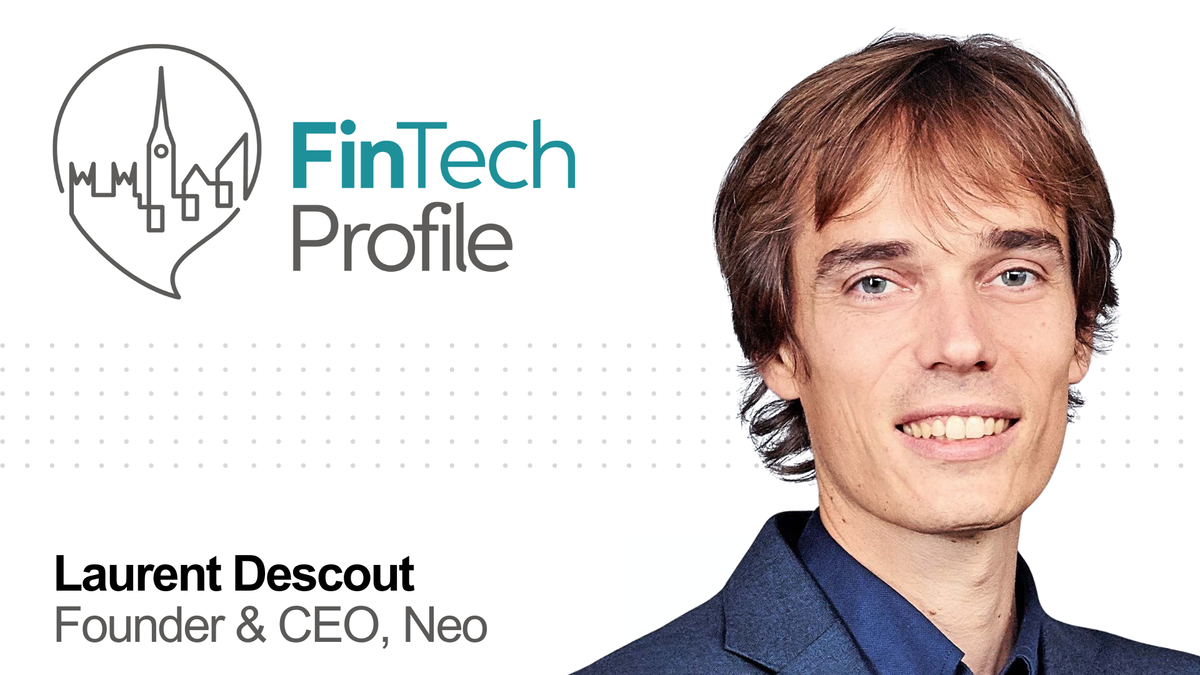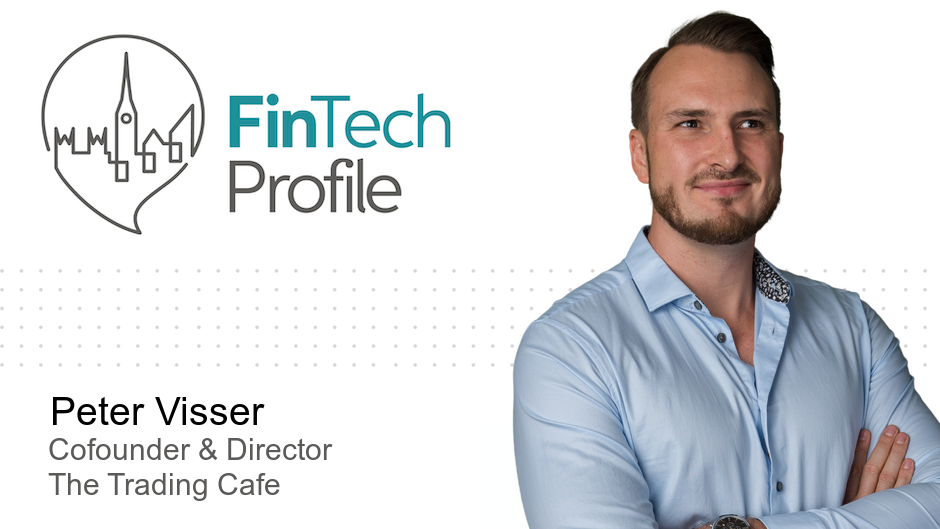Laurent Descout, Founder & CEO, Neo

This time, we're meeting Laurent Descout, the Founder and CEO of all-in-one FX and cash management services provider, NEO (getneo.com). Forget legacy banks and months of delays: NEO can quickly get you up and running with IBANs to make payments in 25 currencies.
My questions are in bold. Over to you Laurent:
Who are you and what's your background?
I studied for a master's degree in economics and banking at Paris Dauphine University and then completed a master's degree in international finance at Brandeis International Business School, Boston, Massachusetts.
In France, I had a great experience, learning about accounting, business law and programming which are all critical aspects of running a finance business which I do now.
In the US, I had an eye-opening experience on how to position and grow a business. The environment at Brandeis also provided the opportunity to exchange ideas and opinions with students from a wide range of countries.
Looking back on this experience, I'm extremely grateful, it has shaped what we do at Neo now, which is very much a global business.
I started my career in Barcelona as an analyst in a tax leverage lease firm. The role was very niche, technical and at times intense, but I had the chance to start under the leadership of a very bright boss.
This helped hone some of the skills that I needed to start Neo. During my nine years in the company, I learned the importance of mastering a topic matter and becoming a specialist. Becoming a specialist in a certain area is impossible without dedicating the necessary time.
What is your job title and what are your general responsibilities?
I'm a co-founder of Neo and I'm also the CEO, but I think what describes my role best is the word "coordinator". I try to ensure everyone is going in the same direction, which involves keeping many different parts and cultures of the company held together.
This all happens while we work to overcome the many challenges that impact all startup companies on a daily basis.
Can you give us an overview of your business?
Neo was founded in 2017 and is a cross-border payments and FX fintech which offers a better way to manage international treasury departments through its all-in-one platform.
Neo has evolved from a platform offering FX trading to becoming a one-stop shop for businesses across the globe, working with more than 300 corporates across 28 countries and more than 8,000 banks are connected to its Bank Identification Code (BIC) on the SWIFT network.
The platform provides FX corporate risk management, international multi-currency bank accounts, cash-flow management, payments data analytics and more all from one place.
It's the first European fintech to offer MiFID II-compliant investment services and PSD2-compliant payment services from a single platform.
Neo provides users with fully registered International Bank Account Numbers (IBANs) from which they can complete payments in over 25 currencies.
While traditional banks often take weeks or even months to set up multi-currency business accounts, a client can be up and running on Neo very quickly.
We cleared €10bn through our multi-currency accounts in 2023 and we announced profitability in January 2024.
Tell us how you are funded?
Neo was founded in 2017 and commercially launched in 2020. We were backed by South Africa-based Skybound Capital and attracted €12m of seed funding between 2017-2022 as previously stated with the last valuation of €40m in 2022.
Neo has been auto-financed for almost two years now and we no longer need external funding to go on growing our European business.
In the future, we may seek external funding to support international expansion and new IT developments of our core banking system. We are looking at Singapore and Asia next, potentially setting up our own office there with our own licence.
What's the origin story? Why did you start the company? To solve what problems?
The Neo founding team had the opportunity to work together previously dealing with FX operations for corporate clients. We realised back then that the pain points for companies were not only about FX pricing but started from the ability to access and open bank accounts, especially multicurrency accounts that could support their global operations.
We knew we had the solution, and we could offer a business account that can be opened easily, offers global currencies and is reachable via API.
Who are your target customers? What's your revenue model?
Our platform is designed specifically for corporates, not individuals. Our clients are primarily businesses that operate across borders, often facing significant friction when opening accounts, converting currencies, and managing their financial operations. That's where our professional expertise comes in.
What sets us apart is that we own our core banking system, which allows us to extend beyond the capabilities of traditional remitters or PSPs. Many of our clients rely on our banking infrastructure and rails to power their operations efficiently.
In fact, we've become a trusted partner for PSPs who have faced challenges with traditional banks. Additionally, we support asset managers who often struggle to find banks willing to back their new ventures. Today, we provide payment solutions to more than 50 PSPs and nearly 60 funds across Europe.
Recently, we've expanded to serve traditional SMEs, particularly those involved in import/export, offering them tailored solutions to meet their unique financial needs.
Modern treasurers are looking for better technology and smarter solutions. They require a centralised treasury system that consolidates analytics, cash flow, and forecasting into a single platform to drive strategic decision-making and optimize cash flow management. This is precisely where Neo's platform excels.
If you had a magic wand, what one thing would you change in the banking and/or FinTech sector?
I would say "make it accessible". When I started my first fintech in 2011, we opened a bank account in three months, now it takes two to three years to be served by one of the top players if you match the right revenue criteria.
These entry requirements and slow onboarding processes are now having a massive impact on businesses.
I'd like to see more corporates realise that they don't have to tolerate being underserviced by traditional banks. There are alternative solutions.
Fintechs, especially neobanks can deliver faster, more efficient, and more secure services that traditional banks simply can't match.
What is your message for the larger players in the Financial Services marketplace?
"Make banks great again."
Banks need to build teams with a genuine drive to win new business, a strong focus on customer care, and the ability to get things done. Since the Lehman Brothers crash, many of the business-minded professionals have been let go, and banks have become more bureaucratic and often worse than public institutions.
The incentive to truly serve clients has diminished and even when it exists, employees lack the empowerment to act.
Try making a critical cross-border payment on a Friday afternoon—good luck getting anyone to answer the phone. At Neo, we do.
Where do you get your Financial Services/FinTech industry news from?
As a European company with a UK office, we must stay informed on what is happening in both jurisdictions. Staying in tune with current affairs is crucial in this industry.
I rely on reputable sources like Bloomberg, Financial Times and CNBC. These sources are updated regularly and provide comprehensive coverage. For fintech, there are some great trade publications that provide really strong content.
I also keep up-to-date via social media channels including X (formerly Twitter) and LinkedIn, following industry leaders and hearing their views on the news and what it all means.
Can you list 3 people you rate from the FinTech and/or Financial Services sector that we should be following on LinkedIn, and why?
- Matteo Rizzi, Co-Founder at FTSGroup.eu
- Marcel van Oost, Connecting the dots in FinTech
- Karen Webster, CEO of PYMNTS
What FinTech services (and/or apps) do you personally use?
Living between 3 countries: Wise for personal money management.
Finally, let's talk predictions. What trends do you think are going to define the next few years in the FinTech sector?
This year, we have seen the rapid growth and use of stablecoins, particularly for cross-border payments. The benefits of tokenization alongside the stability from being tied to the dollar or other currencies have made stablecoins increasingly popular.
While it's too early to say if stablecoins or central bank digital currencies (CBDCs) will eventually replace traditional forms of payments, treasurers need to start preparing.
They should read up and stay abreast of the latest developments and start having conversations about their viability and digital wallets which allow them to hold and utilise them. Those who don't, risk being left behind.
As we see technology develop and banks fall behind with digital adoption, we should continue to see more SMEs looking to alternative providers such as neobanks.
In recent years, fintechs and neobanks have proven their capabilities in providing a faster, easier and more secure service that banks have struggled to compete with.
Additionally, since the banking crisis in March 2023, we have had an increase in interest from businesses looking to open an account with us to diversify their risk as they lost confidence in traditional banks.
Diversification continues to present a huge opportunity for fintech providers with transparent safeguarding policies.
We can also expect to see more banks not only adopt new tools following the AI boom. But we should look to 2010 when banks spent huge amounts to cope with the first wave of fintech innovation, which didn't exactly work out for them.
Given banks are risk-averse institutions, there are also plenty of challenges around AI that need to be thoroughly examined first, such as data protection before many commit to AI adoption.
Fantastic Laurent, thank you so much for taking the time to participate.
You can find out more about Laurent Descout on LinkedIn and read more about his company NEO (getneo.com) at http://www.getneo.com.




